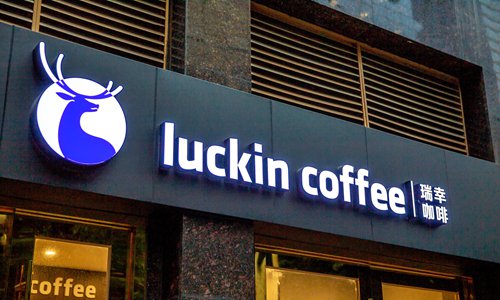Scandal-hit Luckin’s possible delisting causes crisis of confidence in some Chinese firms

A view of Luckin Coffe in Guangzhou, capital of South China's Guangdong Province in December. Photo: VCG
Scandal-hit Chinese brand Luckin Coffee Inc said Tuesday that it has received a delisting notice from Nasdaq and the firm plans to request a hearing.
The Nasdaq Stock Exchange cited two bases for the delisting determination: public interest concerns as raised by the disclosed fabricated transactions and Luckin's past failure to publicly disclose material information.
Luckin said in a press release that it plans to request a hearing before a Nasdaq hearings panel. A hearing is typically scheduled to take place about 30 to 45 days after the date of the hearing request, according to the Nasdaq notice.
The Nasdaq decision is common practice in the interests of self-regulation, and illegal behavior should be dealt with in every stock market and every country, according to industry insiders.
They said the financial fraud at Luckin Coffee will not only damage the brand itself but also cause a crisis of confidence, in the short term, in Chinese firms that want to get listed in the US.
Reuters reported on Tuesday that Nasdaq is considering whether to unveil new restrictions on IPOs, which will make it harder for Chinese firms to debut on the US stock exchange, citing sources.
It said the new rules will require firms from countries, including China, to raise $25 million in their IPO or at least a quarter of their post-listing market capitalization.
Amid rising uncertainties brought on by tightened regulations, along with China-US trade conflicts and escalated tensions caused by COVID-19 spats, more Chinese companies are expected to either retreat from US stock exchanges or delay listing.
Chinese office-sharing company Ucommune Group Holdings filed for an IPO on the New York Stock Exchange in December 2019, but its founder Mao Daqing said nothing about the listing in a press briefing in April.
In 2010, Muddy Waters initiated coverage of China-based RINO International Corp, claiming that it found many of RINO's customer relationships did not exist. From the coverage to RINO's delisting, it took only 23 days.
In the wake of the scandal, over 20 Chinese companies delisted from US stock exchanges, media reports said.
After Luckin's fraud case, domestic and foreign investors and market regulators are paying more attention to public companies' information disclosures and compliance. In the A-share market, with the New Securities Law taking effective on March 1, regulators stepped up penalties for financial fraud cases, while strengthening cross-border auditing cooperation with overseas securities regulators.
It's expected that stock market order will be improved to jointly protect investors' legitimate rights.

